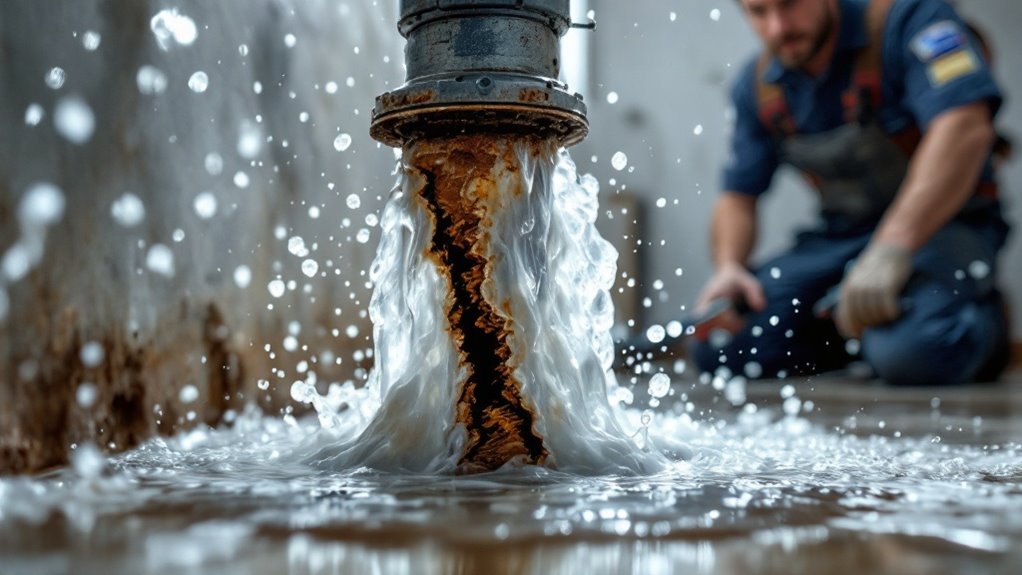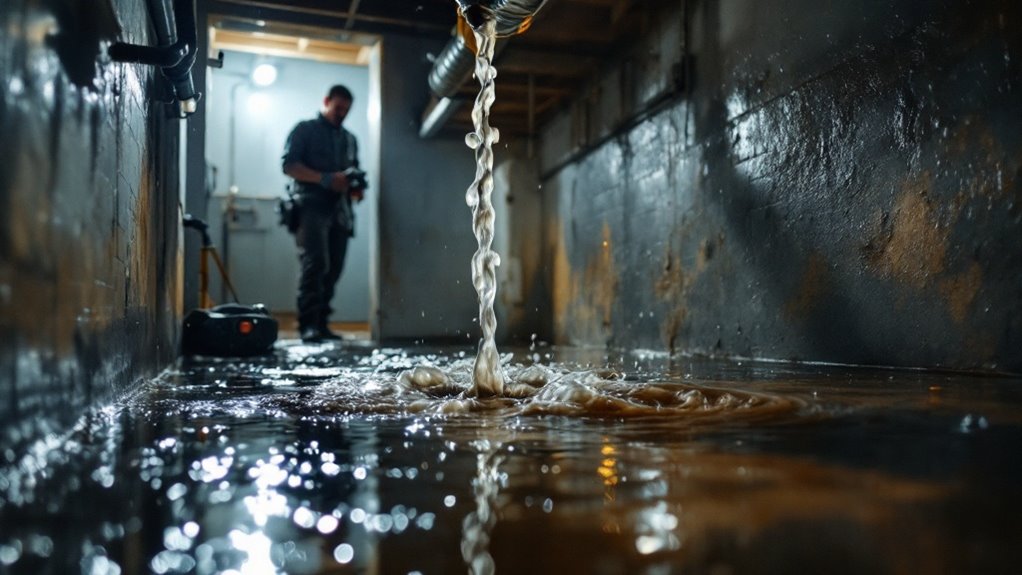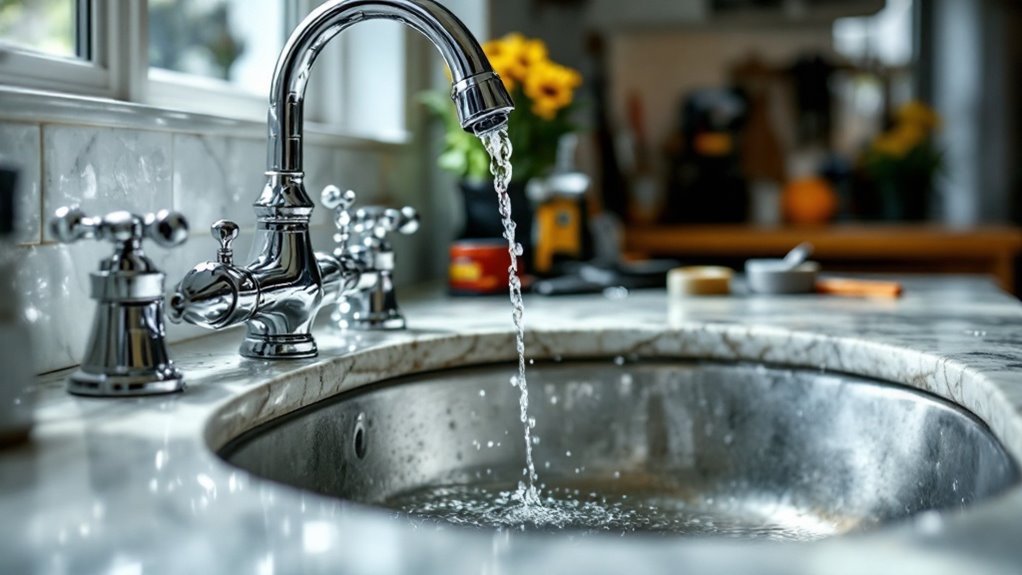In East Point, you could face plumbing emergencies like burst pipes, clogged drains, sewer backups, water heater failures, and leaky faucets. Burst pipes can freeze and expand, while clogged drains often stem from hair and grease buildup. Look out for gurgling sounds or unpleasant odors signaling sewer backups. Water heater failures might be caused by forgotten leaks or thermostat issues. For these problems, Flood Medics offers swift, expert assistance, ensuring you stay informed on effective solutions.
Key Takeaways
- Burst pipes can cause significant water damage; Flood Medics provides emergency plumbing services to quickly address and repair these issues.
- Clogged drains often disrupt daily activities; Flood Medics uses professional tools to effectively clear blockages and restore proper drainage.
- Sewer backups pose health risks and require immediate attention; Flood Medics can assess and resolve sewer line problems promptly to minimize damage.
- Water heater failures can leave homes without hot water; Flood Medics offers troubleshooting and repair services to restore functionality efficiently.
- Leaky faucets and fixtures lead to wasted water; Flood Medics performs inspections and repairs to prevent further leaks and reduce utility bills.
Burst Pipes: Understanding the Causes and Solutions

When temperatures drop, you might find yourself facing the intimidating issue of burst pipes. This happens when water inside the pipes freezes, expands, and ultimately leads to cracks or breaks. To prevent this, effective pipe insulation is essential. By wrapping your pipes with insulation, you create a barrier against the cold, reducing the risk of freezing. Winter preparedness is key; make sure your home's plumbing is protected before the chill sets in. Consider allowing faucets to drip slightly during extreme cold spells, as this can relieve pressure in the pipes. Regularly check for drafts around pipes, and seal any gaps to maintain warmth. By taking these proactive measures, you can greatly reduce the likelihood of costly plumbing disasters this winter. Additionally, knowing how to contact emergency plumbing services can provide you with peace of mind in case of unexpected issues.
Clogged Drains: Identifying and Resolving the Issue
Have you ever wondered why your drains suddenly slow down or stop working altogether? Clogged drains can disrupt your daily routine, but identifying and resolving the issue can be straightforward. Regular drain maintenance is key. Use plumbing tools like plungers or drain snakes to clear blockages effectively. Here's a quick guide to common causes:
| Cause | Solution |
|---|---|
| Hair and soap buildup | Use a drain snake |
| Food debris | Dispose of food properly |
| Grease accumulation | Use hot water and dish soap |
Taking proactive steps can save you headaches later. If the problem persists, don't hesitate to consult a professional to guarantee your plumbing system stays healthy and functional. Many plumbing issues can escalate quickly, so it's essential to remember that 24/7 emergency services are available to assist in urgent situations.
Sewer Backups: Signs and Emergency Response

How can you tell if you're facing a sewer backup? Look for signs like gurgling sounds from drains, multiple clogged fixtures, or sewage odors in your home. These indicators often signal that your sewer line is compromised. Regular sewer maintenance can help prevent these issues, but when emergencies arise, you need immediate solutions.
If you suspect a backup, it's vital to act fast. Avoid flushing toilets or using sinks, as this can worsen the situation. Reach out to emergency services like Flood Medics to assess and resolve the problem swiftly. They'll provide expertise to clear your sewer lines and minimize damage, ensuring your home returns to normal as quickly as possible. Don't wait—addressing sewer backups promptly is fundamental for your peace of mind.
Water Heater Failures: Troubleshooting and Repair
If your water heater suddenly stops working, it can disrupt your daily routine and leave you without hot water for showers, dishwashing, and laundry. To troubleshoot effectively, follow these steps:
- Check the power source: Confirm the heater is plugged in, and the circuit breaker hasn't tripped.
- Inspect the thermostat: Verify that it's set to the desired temperature, typically around 120°F for ideal energy efficiency.
- Look for leaks: Examine the unit for any signs of leakage that may indicate a bigger issue.
Regular water heater maintenance can prevent many failures, so consider scheduling routine checks. If these tips don't resolve the problem, reach out to a professional for repairs, making certain you get back to your hot-water routine swiftly.
Leaky Faucets and Fixtures: Quick Fixes and Prevention

While a leaky faucet may seem like a minor annoyance, it can lead to significant water waste and increased utility bills over time. To tackle this issue, start with basic faucet maintenance. Check the washer and O-ring for wear; replacing these can often stop the drip. If the leak persists, consider tightening the faucet's components or using plumber's tape on threads.
For a longer-term solution, think about fixture upgrades. Modern faucets often feature better technology to prevent leaks, making them a smart investment. Regularly inspect your faucets and fixtures to catch potential issues early. By staying proactive, you'll not only save water but likewise protect your wallet from unnecessary expenses.
Frequently Asked Questions
How Can I Prevent Plumbing Emergencies in My Home?
To prevent plumbing emergencies, you should schedule routine maintenance and invest in leak detection systems. Regular inspections help identify potential issues before they escalate, ensuring your home's plumbing remains efficient and minimizing costly repairs.
What Should I Do While Waiting for a Plumber to Arrive?
While you're waiting for a plumber, stay calm and prepared. Gather your tools for temporary fixes, check for leaks, and block water flow. Your emergency preparedness now can minimize damage and make the plumber's job easier.
Are Plumbing Emergencies Covered by Homeowners Insurance?
Plumbing emergencies might be covered under your homeowners insurance, but that is contingent upon your insurance policies. Review your coverage details to understand what's included, ensuring you're prepared for any unexpected plumbing issues that arise.
How Do I Find a Reliable Emergency Plumber in East Point?
When the pipes start leaking, "a stitch in time saves nine." For reliable plumbing services, ask for emergency plumber tips from friends, check online reviews, and make certain they're licensed and insured for peace of mind.
What Are the Signs of a Plumbing Emergency?
You'll notice signs of a plumbing emergency like leaky faucets, persistent puddles, and sudden water pressure changes. If you spot burst pipes, it's essential to act fast to prevent extensive damage and costly repairs.
